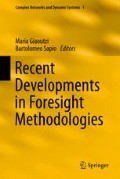Abstract
While ‘foresight’ has become a vogue word for some successful participatory, future-oriented activities, the need for abstract definitions or theoretical underpinnings has arisen to improve efficiency. Defining foresight would be certainly easier if foresight could be included in a special category of practice or if foresight fell under some of the major categories of academic activities. Indeed, some of the foresighters regard foresight as a practice, while others consider it to be more of a science.
Access this chapter
Tax calculation will be finalised at checkout
Purchases are for personal use only
References
Alács, P. (2006). Information – Model – Society, Budapest: MTA-BCE (in Hungarian).
Barnes, B., Bloor, D., & Henry, J. (1996). Scientific knowledge: A sociological analysis. Chicago: University of Chicago Press.
Dopfer, K., Foster, J., & Potts, J. (2006). Micro-meso-macro. Journal of Evolutionary Economics, 14, 263–279.
Glaser, B., & Strauss, A. (1967). The discovery of grounded theory: Strategies for qualitative research. London: Weidenfeld and Nicholson.
Horton, A. (1999). A simple guide to successful foresight. Foresight, 1(1), 5–9.
László, E. (1996). Evolution: The general theory (2nd ed.). New Jersey: Hampton Press.
Lewis, J. D., & Weigert, A. J. (1981). The structures and meanings of social time. Social Forces, 60(2), 432–462. Oxford University Press, Oxford.
Prawat, R. S., & Floden, R. E. (1994). Philosophical perspectives on constructivist views of learning. Educational Psychologist, 29(1), 37–48.
Slaughter, R. (2003). Futures beyond dystopia, creating social foresight. London: Routledge-Flamer.
Sorokin, P. A., & Merton, R. K. (1937). Social time: A methodological and functional analysis. The American Journal of Sociology, XLII(5), 615–629. The University of Chicago Press, Chicago.
Wilson, E. B. (1952). An introduction to scientific research. New York: McGraw-Hill.
Acknowledgements
This work was supported by the Hungarian Science Foundation TÁMOP-4.2.1/B-09/1/KMR-2010-0005 project.
Author information
Authors and Affiliations
Corresponding author
Editor information
Editors and Affiliations
Rights and permissions
Copyright information
© 2013 Springer Science+Business Media New York
About this chapter
Cite this chapter
Alács, P. (2013). Micro-Meso-Macro: From the Heritage of the Oracle to Foresight. In: Giaoutzi, M., Sapio, B. (eds) Recent Developments in Foresight Methodologies. Complex Networks and Dynamic Systems, vol 1. Springer, Boston, MA. https://doi.org/10.1007/978-1-4614-5215-7_7
Download citation
DOI: https://doi.org/10.1007/978-1-4614-5215-7_7
Published:
Publisher Name: Springer, Boston, MA
Print ISBN: 978-1-4614-5214-0
Online ISBN: 978-1-4614-5215-7
eBook Packages: Business and EconomicsBusiness and Management (R0)

